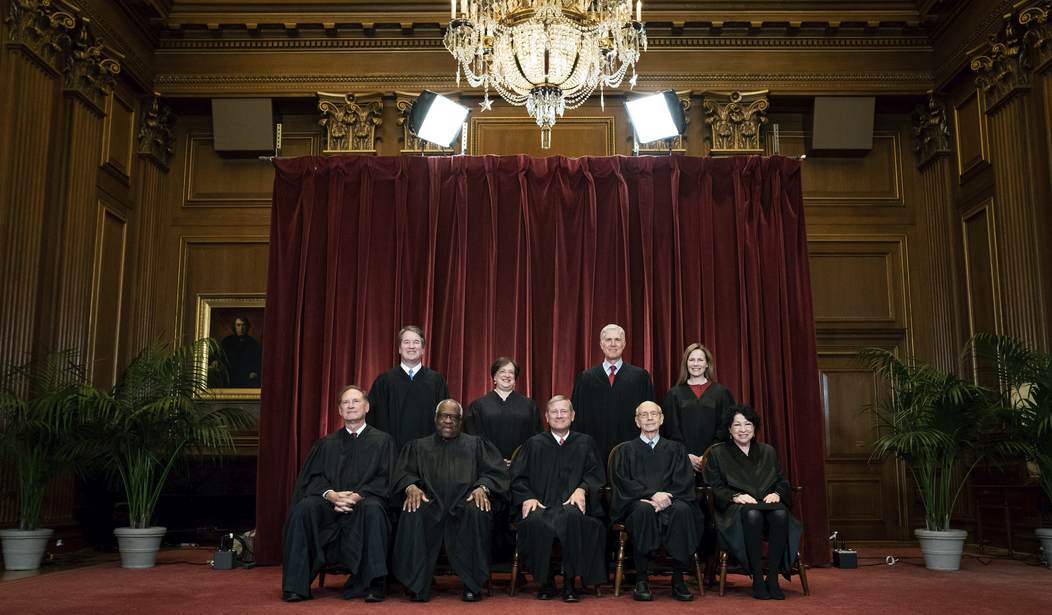Last summer, in the case of Ramos v. Louisiana, the Supreme Court ruled that convictions in criminal court required a unanimous verdict by the jury. The ruling impacted defendants in Louisiana and Oregon, the only two states that allowed convictions where a jury ruled 10-2 against the defendant. That immediately raised the question of what was to become of thousands of convicts who had been found guilty by a less than unanimous jury verdict. Louisiana prisoner Thedrick Edwards, who had been convicted of multiple counts of rape, armed robbery and kidnapping by a non-unanimous jury, challenged his conviction on this basis. Last night, the Supreme Court ruled in Edwards v. Vannoy that the new rules were not retroactive and the convict’s sentence of life without parole would stand. (Associated Press)
The Supreme Court ruled Monday that prisoners who were convicted by non-unanimous juries before the high court barred the practice a year ago don’t need to be retried.
The justices ruled 6-3 along conservative-liberal lines that prisoners whose cases had concluded before the justices’ 2020 ruling shouldn’t benefit from it. The decision affects prisoners who were convicted in Louisiana and Oregon as well as the U.S. territory of Puerto Rico, the few places that had allowed criminal convictions based on divided jury votes.
Justice Brett Kavanaugh wrote for the conservative majority that the court’s “well-settled retroactivity doctrine” led to the conclusion that the decision doesn’t apply retroactively.
This was another 6-3 split decision, with Brett Kavanaugh writing the majority decision and Elana Kagan writing the dissent for the court’s three liberal justices. Kavanaugh and the rest of the majority found that the previously convicted felons were not entitled to new trials based on the court’s retroactivity doctrine. Kagan bemoaned the ruling, writing that “those convicted under rules found not to produce fair and reliable verdicts will be left without recourse in federal courts.”
This is a troubling ruling, to say the least. The case being made by legal experts arguing against Edwards seemed to be based almost entirely on the fact that thousands of cases in Louisiana and Oregon would be affected and if all of them were granted new trials it would be “massively disruptive” to the legal systems in both states. It was also noted that some of the cases were far enough in the past that they could not effectively be retried, leading to the potential release of violent offenders.
Both of those statements are almost certainly true, but does that justify the decision? If Edwards’ trial (or those of the thousands of others whose trials ended the same way) had been held in any of the other 48 states, he would have been acquitted. Further, this same court has already ruled that a nonunanimous jury verdict fails to meet the bar established by the Sixth Amendment for fair trials and convictions. Is a hugely disruptive backlog of cases in two states a sufficient reason for any of those other individual cases to stand as previously decided?
The other side of the argument, which Kavanaugh also touched on, is the fact that the rules said what they said prior to July of 2020. The state laws allowing for 10-2 convictions in both states had previously been challenged and upheld. In that light, the convictions were valid because they were delivered in accordance with the same set of rules that everyone in the state had to play by. And, as previously noted, the high court’s retroactivity doctrine only allows for very few situations where a change in the laws can be applied retroactively. Clearly, the majority did not find that this situation qualified under that doctrine.
This case is already in the books, so nothing is likely to change the situation in the foreseeable future. But that doesn’t mean that this ruling doesn’t have some disturbing aspects to it. More importantly, Edwards v. Vannoy will probably be cited as precedent in any future cases where the alteration or reversal of existing laws leads convicts to seek a retroactive dismissal of their convictions.








Join the conversation as a VIP Member